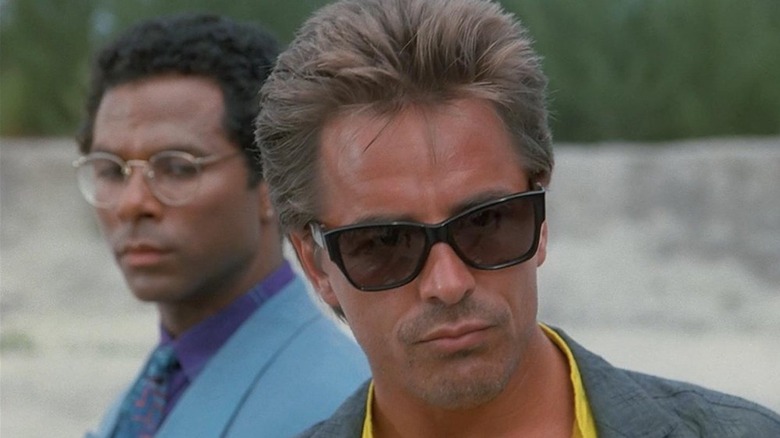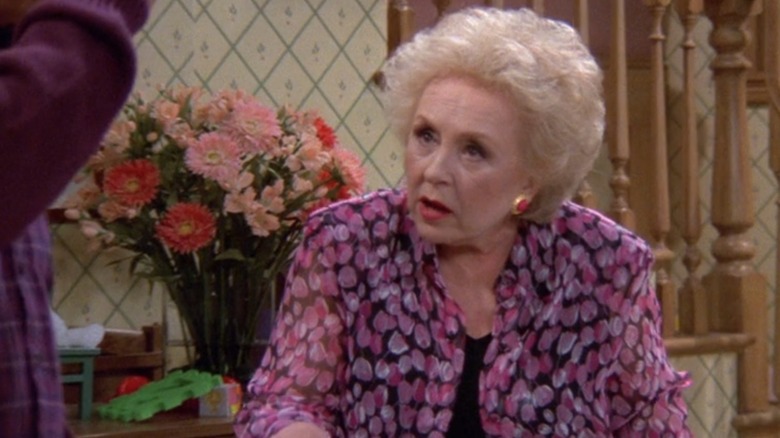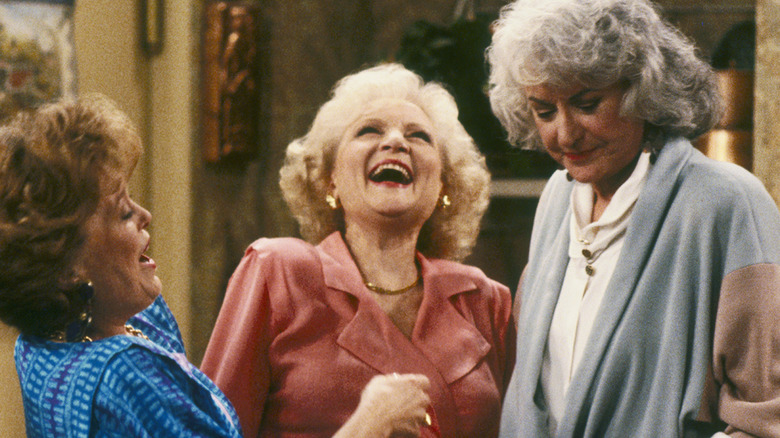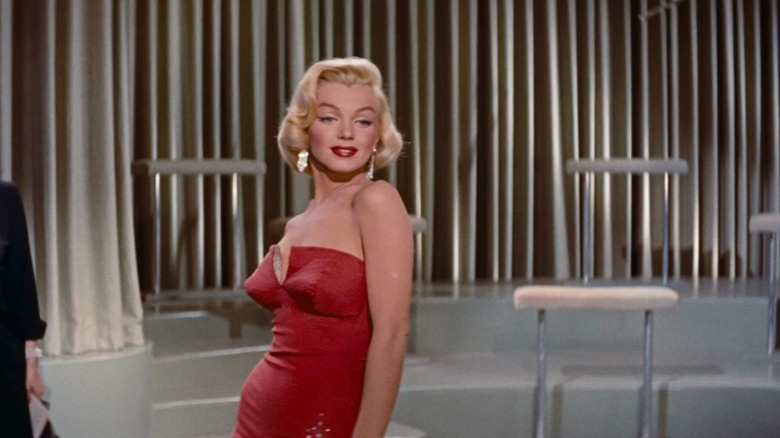Without Miami Vice, There Would Be No Golden Girls
The '80s were a different time; shoulder pads were in, Reaganomics was taking over the country, and in 1984, a hyper-stylish show called "Miami Vice" was about to become all the rage. Before the Florida-set cop series ever premiered on NBC, though, it had already inspired another series, one that seemed to have very little in common with the Michael Mann-produced action show.
That series was "The Golden Girls," the popular and gut-bustingly funny sitcom about women of a certain age that has only become more beloved in the decades since it ended. "The Golden Girls" is remembered for its positive and honest conversations about aging and its characters' penchant for savage, hilarious quips. It also bolstered the fame of its already-famous stars, Bea Arthur ("Maude"), Betty White ("The Mary Tyler Moore Show"), Rue McClanahan (also "Maude"), and Estelle Getty ("Mask"). Put together around a kitchen table, the four women were a potent comedic cocktail responsible for pulling off some of the funniest bits in sitcom history. Yet they only ended up around that table thanks to a one-off joke made during an NBC TV special — one that promoted "Miami Vice."
Welcome to Miami Nice
The story of the inception of "The Golden Girls" has been captured in books that include Jim Colucci's "Golden Girls Forever" and Matt Baume's queer TV history "Hi Honey, I'm Homo!" Regardless of the source, the setting is roughly the same: a 1984 taping of an apparently rather boring hour-long TV special meant to hype up NBC's September lineup. According to Baume, the lineup featured a section with running commentary from two stars of the network's current shows, Selma Diamond ("Night Court") and Doris Roberts ("Remington Steele," though she would ultimately become most famous for her turn on "Everybody Loves Raymond"). When it came time to introduce "Miami Vice," the pair apparently bantered lustily about stars Don Johnson and Philip Michael Thomas, playing the part of two terrifically funny cougars. "It had been the highlight of laughter in a long, boring shoot night," future NBC president Warren Littlefield (then VP of Comedy Programs) recalled in "Golden Girls Forever."
Before the "Miami Vice" introduction, Roberts and Diamond also riffed on the show's title, with Diamond joking that she had misconstrued the title as "Miami Nice." That fictional show sounded a lot different than the pop art time capsule "Miami Vice" ended up being. "We're here to introduce a show that takes place at the most wonderful resort in the world," Diamond said, according to Baume's book. She continued: "Miami: a land of Coppertone and corned beef, mink coats, cha cha lessons, The Jackie Gleason Show ..." The joke show seemed to appeal to the sensibilities of Floridian retirees. "Selma, honey, this show is not called 'Miami Nice,' this is called 'Miami Vice,'" Roberts corrected.
'We felt like lightning had struck us'
The exchange was brief, but it gave Littlefield an idea. "That fall preview special had all these hot young stars from other shows, but here were these two middle-aged actresses who stood up in the spotlight and bam! They were sharp, they were hitting it, and they made their segment pop," he recalled in "Golden Girls Forever." His team felt that, just as "The Cosby Show" had opened them up to a world of talented Black actors who hadn't been getting the work they deserved, "The Golden Girls" could tap into the "large pool of wonderful older actresses who weren't doing feature films and television, who were being ignored." Originally, Baume writes that "Ladies' Day" was another potential title, but "Golden Girls" ultimately won out.
"We felt like lightning had struck us with something," Warren shared, explaining that the "Miami Nice" idea was reinforced by statistics his team would come across about the ways in which older women were forgotten by society. "It was always some sad statistic," he shared, "and it reinforced what we were feeling about 'Miami Nice,' that somehow, these women would be there for each other, and they would take a difficult reality and make a bright picture out of it." Creator Susan Harris was brought on board, the ladies were cast, and that series about a bright picture of old age became a beloved reality.
What's Marilyn got to do with it?
Oddly, there's a second story about the inception of "The Golden Girls" floating around that has nothing to do with "Miami Nice." According to Colucci, then NBC president Brandon Tartikoff wrote in his memoir "The Last Great Ride" that he wanted to make a series about women roommates in the style of the Marilyn Monroe-led screwball comedy "How To Marry A Millionaire." He wrote that the idea of ladies looking for love wasn't exactly a popular idea among women writers he pitched it to in the feminist-forward '80s, but after a visit with an elderly aunt, he realized the "How To Marry A Millionaire" idea would work better with women of a certain age.
"Brandon may not have shared those thoughts with us all, so I'm not sure how the 'How to Marry a Millionaire' stuff ended up actually being connected to the development of 'The Golden Girls,'" Littlefield recalled in "Golden Forever." Regardless of how much a shiny Monroe flick figured into the creation of the series, Roberts and Diamonds' "Miami Nice" quips are considered the unlikely origin story for the enduring series. Baume calls the riff that inspired Littlefield "one of the luckiest accidents in television history," and he's not wrong. Few comedic ensembles have been as well matched as Arthur, McClanahan, White, and Getty, and to this day, "Golden Girls" remains a comfort to anyone who's ever had fears about growing older. Don't say corny network promotions never did anything for you.
"The Golden Girls" is currently streaming on Hulu, while "Miami Vice' is available on Freevee.



